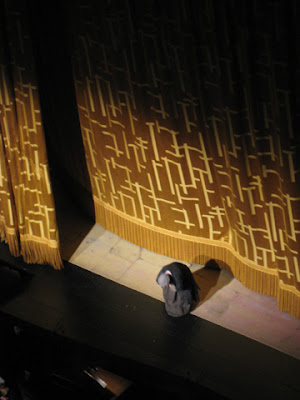The blind leading the cast
 Ponchielli LA GIOCONDA, Met 24.IX.2008; c. Callegari (d); Voigt, Borodina, Podles, Machado, Guelfi.
Ponchielli LA GIOCONDA, Met 24.IX.2008; c. Callegari (d); Voigt, Borodina, Podles, Machado, Guelfi.
What an unusual evening. As Steve Smith correctly noted, two minor roles garnered the bulk of the ovation. First: Ewa Podles, of course, in the role of La Cieca (pictured above), who hasn't been seen on this stage since, oh, I was closeted and in elementary school. Podles's primary talent is to sound like she's singing a full octave lower than written, and with a volume to match any cavernous space: queens like that sort of thing. The other crowd favorite: ballet superstar Angel Corella (and his girl partner what's-her-name), whose primary talent is to have the roundest buttocks ever, and the rare ability to uplift Ponchielli's music into a rousing twirlfest: queens like that sort of thing too.
But the highlight of my evening was Olga Borodina. I've never truly raved about this mezzo. Borodina has been churning out lovely, polished and professional performances, but till recently, her sound, to my ears, had been a tad turbid and muffled, at times charcoal grey if it were a color, never catching my devoted fancy in any role, save perhaps the Dalila. Indeed I may be developing tumors in my ears (how you wish), because how is it that she sounds like a different singer today? I first noticed the change in the Verdi Requiem for Pavarotti last week (yes, I found a way to sneak in; I may get to writing about it, if I don't get too drunk this weekend). Then in this Gioconda, my observation has been bolstered: her current sound seems to have developed a spine, a more direct, cutting line that could enunciate the tune more effectively. Add to that her innate musicality and dramatic intelligence, and we now have a formidable mezzo to carry on from Dolora Zajick.
As tradition dictates, let's now state the obvious: Deborah Voigt, we love her, but she does not have the right sound or temperament for this role, or any Italian role for that matter. So the most she could try for is a clean performance, which she delivered with some tension but with solid gusto. Why she's not pouring her efforts exclusively into roles like Elektra or Brunnhilde (which will happen eventually, but why not this season??) may be more about economic positioning-- like dear Karita Mattila choosing to waste her time on silly but lucrative things like Manon Lescaut and Tosca. But anyway, a strong Gioconda is absolutely needed to distract us from the opera's majestic emptiness-- for instance, an Aprile Millo (who was spotted sitting in the director's box by a friend! what could it mean?) or somesuch. Even Violeta Urmana from two years ago made a far better impression.
Nonfactors: Aquiles Machado and Carlo Guelfi. The conductor, Daniele Callegari, debuted with a soporific reading of the score. Not good for a performance ending after midnight.



